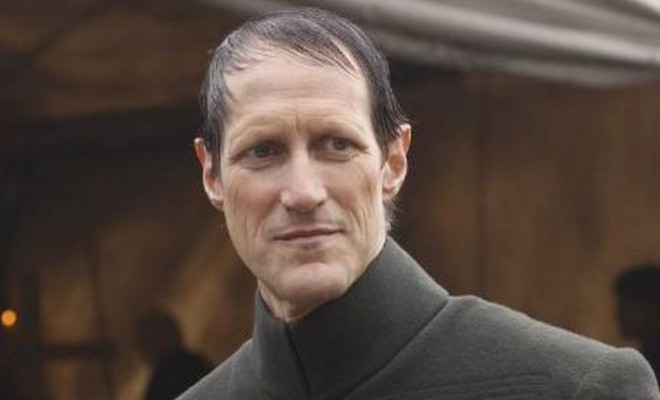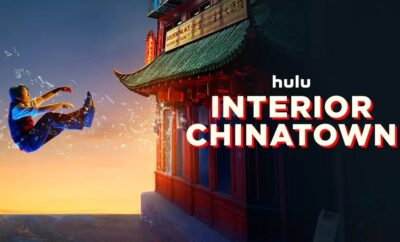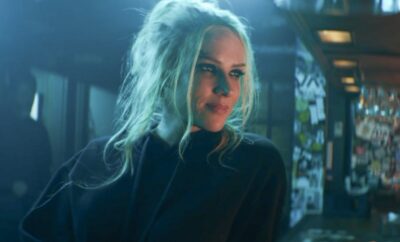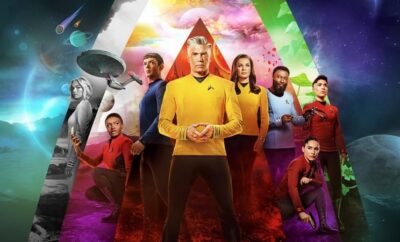
Interviews
Christopher Heyerdahl – Hell On Wheels
By: Jamie Steinberg
Q) What are the recent projects that you are working on?
A) Right now, “Hell on Wheels” is taking up most of my time. There are a few projects coming up. It’s one of those things in this business where a number of things come your way and then scheduling ultimately dictates which of those things you can do. It’s an interesting business that way. There are so many people involved and everyone’s schedule morphs and changes with each hour of every day. You never know what can happen, but there are a number of things coming up that look like they could take me to the four corners of the world. It’s an exciting time and it’s a time when we’re basically all saying goodbye. We said goodbye to Tzi Ma on “Hell On Wheels” and that was yet again the best of us going early. Tzi Ma was an amazing addition to our “Hell On Wheels” family and he created a beautiful character with such heart and self belief. He was really able to stand up to those characters like Chang who are the bullies of the world and without any fear for self just stand up for what is right. Tzi is absolutely that man and such a beautiful, generous person. He’s such a great actor. He’s leading the way for what could be any one of us with this final year of “Hell On Wheels.” Nobody is safe.
Q) You often play dark, intense and disturbed characters such as The Swede on “Hell On Wheels” and then your recent role on “Gotham.” What is it about these roles that draws you to them?
A) You are talking about two very different types of characters in very different worlds. I’m drawn to the DC Comic universe. It’s something that I’m interested in and that whole world I find fascinating because all of the characters are enormous and very bold. Those are the characters that interest me. In some ways, I can contradict what I just said because The Swede is a very big character. He is a character that in many ways where if you saw somebody like that in real life you would think, “Oh, that’s too much.” You wouldn’t be able to have that on stage because it is just too big, too full. Those are the kind of characters that I am definitely drawn to, characters that are out of the cannon of real life. The kind of characters that if you walked down the street they are the people you are going to be drawn to, we’re going to want to look at and wonder where they are going or where they have been. When you walk down the street and you walk past two hundred people, you just look at them as one more human being. Then, there will be somebody that pulls you out of your revelries and piques your curiosity. It is something that grabs your curiosity or something in your gut makes you feel good or maybe feel a little bit funny and want to walk on the other side of the street. Or, you could think to yourself, “I never do this, but I’m going to walk over and say ‘hello’ to this person.” You engage them in some way because you are more curious than afraid so you want to know who that is. Those are the people that become characters in a movie, someone you would want to see for an hour or an hour and a half or someone becomes a character on a television show you want to watch for forty-five minutes each week. Those are the kinds of characters I’m interested in, whether they be theoretically villains, antagonists or the hero. Usually, the antagonist is a little more!
Q) What is it the antagonistic relationship between Cullen and The Swede? Is it a difference of ideals, the need for power or does The Swede have something to prove?
A) I think they are a reflection of one another. The question I ask myself on a regular basis is why does The Swede not kill Cullen (Anson Mount) and why does Cullen not kill The Swede? Cullen is always saying less than complimentary things about The Swede, even perpetually calling him “The Swede” all of the time because he knows that it strikes a chord. One of the elements we are going to discover over the next couple of years (we’re calling it one season split into two) is how The Swede got his name and there is a deep irony in that. At the same time, it’s a major wound. There is a strange attraction between these two men and I think that they reflect each other. I think for Cullen, he sees in The Swede this innate ability to survive and there doesn’t seem to be any rules. I would say that for The Swede looking at Bohannan, he sees a man who is hiding from himself. Bohannan is a cold blooded killer and yet he works so hard to develop and follow his idea of his moral compass. I think The Swede finds that admirable and inspiring, but at the same time he wants to give Bohannan the example of freedom – which is his ability to be anyone, go anywhere, accomplish anything and live really by any means possible.
Q) The Swede is such a chameleon. Is freedom his ultimate goal?
A) I think that what The Swede is following is that he is a very devout man and he believes God (the Heavenly Father, the All Powerful One, His Creator) will guide him in the right direction. He’s also a believer that if a human being sits back and makes no choices or takes no action then someone who is capable of taking action will step up. So, he makes very bold choices. He steps forward into the brink. He dives in. He believes whole heartedly that God will guide his way. If he steps in the wrong way, then God will show him that he stepped in the wrong way. Through pain and great diversity, he will be lead toward his ultimate goal.
Q) What have been some of your most memorable moments from filming “Hell On Wheels?”
A) Pretty much every scene with Anson! When ever Cullen and The Swede get together magic happens. It’s not often that you come together with somebody and there is a chemistry that is undeniable. Really, any of those scenes (because there really aren’t that many) are wonderful. This year, the very first scene was probably my favorite of the season because Anson made some fantastic choices. You can make two choices when you are given a conflict: you can make the choice to receive it as if it does nothing for you or you can receive it as if it is one hundred percent life and death. With that first meeting, you see The Swede at the door and instantly it is life and death. Cullen throws himself below the window, grabs his gun and comes to the door with his pistol. It wasn’t written like that. That’s pure Anson and it was a huge choice. I think it pays off beautifully because, again, it sets up that the choice of where Cullen could have easily taken his gun, put it through the window and shot him dead. Yet, he chose not to. That is the great journey that The Swede watches in this man; his desperate desire to become something else. Perhaps something that he is not…That is the journey that they take together. They become the instigator of the other’s destiny. That holds true in every one of the scenes they play together.
Q) Many of the cast members I’ve spoken to wished they had a chance to have had more scenes with you or worked with you at all. Is there someone you wish you had gotten a chance to work with that you may not have had a chance to or someone you want more scenes with?
A) Anyone I didn’t have a scene with I would like to have worked with! It’s a great group of people. I would say I would have liked to have gone back to having a scene with Mickey (Phil Burke). I remember the first time I had a scene with Phil and he is such a wonderfully alive actor and so generous. He’s a great listener. I would love to have been able to touch that relationship again. It’s doubtful it is going to happen because we are now in separate towns far, far away. A scene with Eva (Robin McLeavy) would have been fantastic. Touching again with Durant (Colm Meaney) would have been great. I would have loved a scene with Tzi Ma. Tzi is such a beautiful actor and he created a great character.
Q) What do you think it is about “Hell On Wheels” that has made it so popular?
A) I think that everyone loves a Western. So many of us grew up pretending to either be the Indian or the cowboy. There is something on both sides of those equations. Both are tragic in many ways. I think it offers that lawless time when every human being is put in a position of having to make a choice when there is no laws and given the situation of great adversity, what are the choices that you make when there is nobody around the corner telling you and forcing you to do (theoretically) the acceptably right thing. I think that concept of ultimate power, freedom to make a choice, what choice would we make? We can all watch shows like this and root for the hero and fear for the antagonist and believe that we would be on the side of right. At the same time, when these shows hit the mark in their themes and their writing, when we get what we think we’ve been wanting maybe it strikes a chord in us and we question if we would have done any better?
Q) Is there something you would like to share about the upcoming episodes of “Hell On Wheels” that you want to be sure to share with fans or clear up any misconceptions about The Swede?
A) It’s interesting because when you do a television show, you do take after take after take. With each take, you try to bring different nuance to the character. Ultimately, The Swede becomes the final editing choices. That’s the character. I have a thousand and one different perspectives of the character for me and what I find most interesting is when I watch the show (I don’t see any cut before we all see it on television) I see what the character is. That’s the final cut. Those are the actions, those are the looks that the character finally becomes. So, I have no idea what the character is going to be one, two, three, four, five or six episodes through the next two seasons. I look forward to meeting the characters’ choices. I’ll discover it as the same time as you.
Q) What would you like to say to everyone who is a fan and supporter of you and your work?
A) Thank you! We do this work and when we’re doing it on the stage it is very immediate. We rehearse, we go on stage, we do a show and people respond when the show is over. When you are doing a television show, the only immediate response from anybody watching is the crew. So the crew becomes the audience. They reflect the work. When it finally comes on television or on to film and everyone gets a chance to see it and responds positively and becomes a supporter – supports the work – there is no better feeling because that is the final element of what we do. We put our passions into the choices that we make and into interpreting the words and situations we are given and we hope that people respond to that work and that passion. When it happens, it feels wonderful. So to anyone who supports my work and enjoys what I do, thank you. It is a big part of why I do what I do.





You must be logged in to post a comment Login